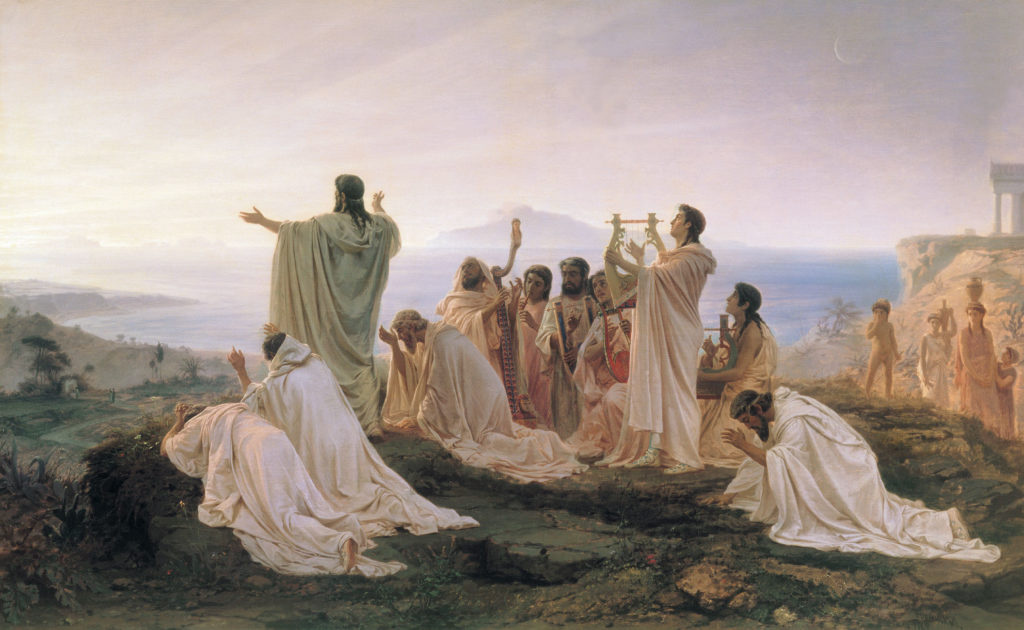[Greek] μυέω (mueō), [Latin] mutare: to shut the eyes or mouth, to initiate into a mystery (musterion), to instruct, to learn the secrets, to teach; Php. 4:12

Background Information:
Greek Hellenism: This term means to initiate (be initiated) into the mysteries and to be instructed in. The closed eyes and closed mouth do not signify blindness or muteness. Instead, these actions indicate secrecy and silence. Herodotus’ Histories II,51 states, “Whoever has been initiated in the rites of the Cabeiri, which the Samothracians learned from the Pelasgians and now preach, understand what my meaning is.” Plato, an initiate into the mysteries, states, “Our mysteries had a very real meaning, he that has been purified and initiated shall dwell with the gods.” Herodotus Histories VIII, 65 states “Every year the Athenians observe this festival. The voice you hear is the “Iacchus” they cry at the festival. Keep silent and tell this to no one else.”
Old Testament: In contrast to the monotheistic worship of God (Yahweh), the mysteries are often associated with worship of gods, goddesses, and idols. The apocryphal book 3 Maccabees was written in response to the crisis affecting Egyptian Jews, when Egypt was made a Roman province in 24 B.C. An edict was made that the Jews were to be enslaved and branded with the ivy leaf of Dionysus. The alternative is to forsake their Hebrew faith and undergo initiation into the mysteries. Moses instructs the Israelite judges to kill those men who have submitted to the rites of Baal of Peor.
New Testament: This term, meaning to learn a secret, occurs only once in Philippians. Generally, the Hellenistic notion of the mysteries were considered as esoteric knowledge only available to a few people. Paul illustrates he has learned the secrets (mysteries) of Christ from his own daily life. Unlike the Hellenistic mysteries, these Christian mysteries can be available to all who seek these. Paul contrasts Christianity with these pagan religions. In other words, Paul undergoes the mysteries, experiencing the power of Christ.
Scripture:
“I know the indeed how to live in humble circumstances; I know also how to live with abundance. In every circumstance and in all things I have learned the secret of being well feed and of going hungry, of living in abundance and of being in need.” Php. 4:12
Paul makes a distinction between the Christian faith and the pagan religions. The message of Christ is available to all.
Conclusion:
Mystery, mysterious, mute
It is interesting that this activity involved shutting or closing. I was somewhat surprised that even the learned and wise philosophers and writers were devoted to the gods. The gods served to guide men in their daily affairs.
It is not surprising that the monotheistic Old Testament culture would be profoundly opposed to the mysteries of religions and cults. 3 Maccabees illustrates the persecution that some Jews had faced concerning the mysteries of other religions.
Unlike the pagan mysteries, Christianity is available to all. In the Roman empire, a soldier would give an oath (sacramentum) of fidelity to his superior. In a sense, the soldier’s oath was a sign of the beginning of new life in his purpose.
Over time, the meaning of the mysteries would change. In the third century, mysterion would be identified with the Christian sacraments (baptism and the Eucharist). St. Augustine described a sacrament as an outward and visible sign of an inward and invisible grace. There is a mysterious aspect of the Christian sacraments. When one becomes baptized, that person also becomes a new creation in the Christian life.
